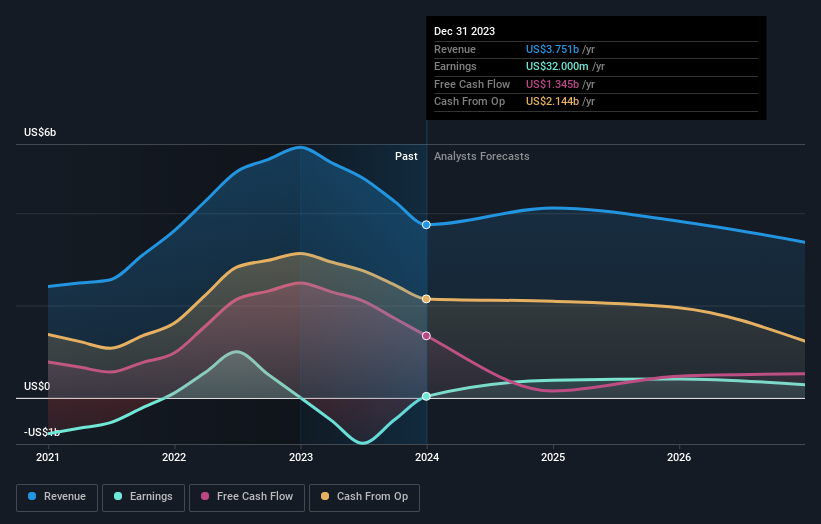Harbour Energy plc Just Missed EPS By 77%: Here's What Analysts Think Will Happen Next
It's shaping up to be a tough period for Harbour Energy plc (LON:HBR), which a week ago released some disappointing yearly results that could have a notable impact on how the market views the stock. It wasn't a great result overall - while revenue fell marginally short of analyst estimates at US$3.8b, statutory earnings missed forecasts by an incredible 77%, coming in at just US$0.04 per share. The analysts typically update their forecasts at each earnings report, and we can judge from their estimates whether their view of the company has changed or if there are any new concerns to be aware of. So we gathered the latest post-earnings forecasts to see what estimates suggest is in store for next year.
Check out our latest analysis for Harbour Energy
Following the latest results, Harbour Energy's seven analysts are now forecasting revenues of US$4.11b in 2024. This would be a meaningful 9.7% improvement in revenue compared to the last 12 months. Per-share earnings are expected to leap 1,240% to US$0.56. Yet prior to the latest earnings, the analysts had been anticipated revenues of US$4.31b and earnings per share (EPS) of US$0.52 in 2024. So it's pretty clear that while sentiment around revenues has declined following the latest results, the analysts are now more bullish on the company's earnings power.
There's been no real change to the average price target of UK£3.70, with the lower revenue and higher earnings forecasts not expected to meaningfully impact the company's valuation over a longer timeframe. The consensus price target is just an average of individual analyst targets, so - it could be handy to see how wide the range of underlying estimates is. The most optimistic Harbour Energy analyst has a price target of UK£5.41 per share, while the most pessimistic values it at UK£2.74. As you can see, analysts are not all in agreement on the stock's future, but the range of estimates is still reasonably narrow, which could suggest that the outcome is not totally unpredictable.
Taking a look at the bigger picture now, one of the ways we can understand these forecasts is to see how they compare to both past performance and industry growth estimates. We would highlight that Harbour Energy's revenue growth is expected to slow, with the forecast 9.7% annualised growth rate until the end of 2024 being well below the historical 20% p.a. growth over the last five years. Compare this with other companies in the same industry, which are forecast to see a revenue decline of 1.6% annually. Factoring in the forecast slowdown in growth, it's pretty clear that Harbour Energy is still expected to grow faster than the wider industry.
The Bottom Line
The biggest takeaway for us is the consensus earnings per share upgrade, which suggests a clear improvement in sentiment around Harbour Energy's earnings potential next year. Unfortunately, they also downgraded their revenue estimates, and our data indicates that is expected to perform better than the wider industry. Even so, earnings per share are more important to the intrinsic value of the business. Even so, earnings per share are more important to the intrinsic value of the business. The consensus price target held steady at UK£3.70, with the latest estimates not enough to have an impact on their price targets.
Keeping that in mind, we still think that the longer term trajectory of the business is much more important for investors to consider. We have estimates - from multiple Harbour Energy analysts - going out to 2026, and you can see them free on our platform here.
That said, it's still necessary to consider the ever-present spectre of investment risk. We've identified 2 warning signs with Harbour Energy , and understanding these should be part of your investment process.
Have feedback on this article? Concerned about the content? Get in touch with us directly. Alternatively, email editorial-team (at) simplywallst.com.
This article by Simply Wall St is general in nature. We provide commentary based on historical data and analyst forecasts only using an unbiased methodology and our articles are not intended to be financial advice. It does not constitute a recommendation to buy or sell any stock, and does not take account of your objectives, or your financial situation. We aim to bring you long-term focused analysis driven by fundamental data. Note that our analysis may not factor in the latest price-sensitive company announcements or qualitative material. Simply Wall St has no position in any stocks mentioned.

